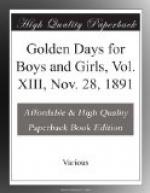As we came near the place where Rufe had seen the deer, we noticed a slender, black animal crouching in the bushes. It proved to be a tall hound, and, after some urging, he was persuaded to enter the boat.
The reason for the deer’s early bath was now apparent; but Rufe was surprised that he did not hear the hound’s barking, for, like all old hunters, it was his habit, in the deerhounding season to step into the open air and listen, at short intervals during the morning, for the barking of hounds.
This morning had been no exception to the rule; but neither before nor after seeing the deer had Rufe heard the well-known baying of a deerhound.
We took the gaunt animal into our boat and carried him back to the shanty. He proved to be half-famished and wholly exhausted, and, after a hearty meal, lay in a comatose condition before the fire. He must have had a long chase, probably coming from some neighboring lake, for Rufe, who knew all the hounds on our lake, had never seen him before.
When two or three days had passed and the black hound had recovered his strength, Rufe took him into the woods with our own dog and put them both upon the track of a deer.
The black hound followed the track steadily, but he uttered no bark, confining himself to a low, excited whimpering. Even when the game was roused and the hot scent gave ardor to the pursuing dogs, the black hound did not join in the frantic baying of his companion.
The deer did not enter the lake at the runway where I was watching, but with my spy-glass I saw it plunge into the water a quarter of a mile away. A boat happened to be passing at the time and the deer was killed. A moment later the black hound appeared on the shore. He could not have been forty rods behind the deer, but no bark betrayed the eagerness of his pursuit. I heard the baying of my own dog, as he slowly followed the scent, away back among the wooded hills that rose on all sides of the lake.
This, then, was the reason why Rufe had heard no baying on the morning when we had found the black hound. He was silent, and as swift as he was silent.
As I looked at him that evening, I noticed he did not have the long ears and heavy jaws of the common American deer or foxhound. His long, sharp nose and slender proportions indicated the blood of the Scotch staghound, or that of some large breed of greyhound.
But this cross had not made him more delicate or less fierce. Even Rufe was afraid to handle him roughly, for, unless treated with every consideration, the great hound snarled, and showed rows of savage teeth. He ruled over the other dogs with a cool assumption of more aristocratic breeding.
The morning after the deer was driven to water and the black hound had proved his swiftness and persistence, Rufe again went into the woods for the purpose of starting deer with the two hounds, or “putting out the dogs,” as it is called; but this morning it was the guide’s intention to put the dogs on separate tracks. They differed too much in speed to be useful when following the same deer.




